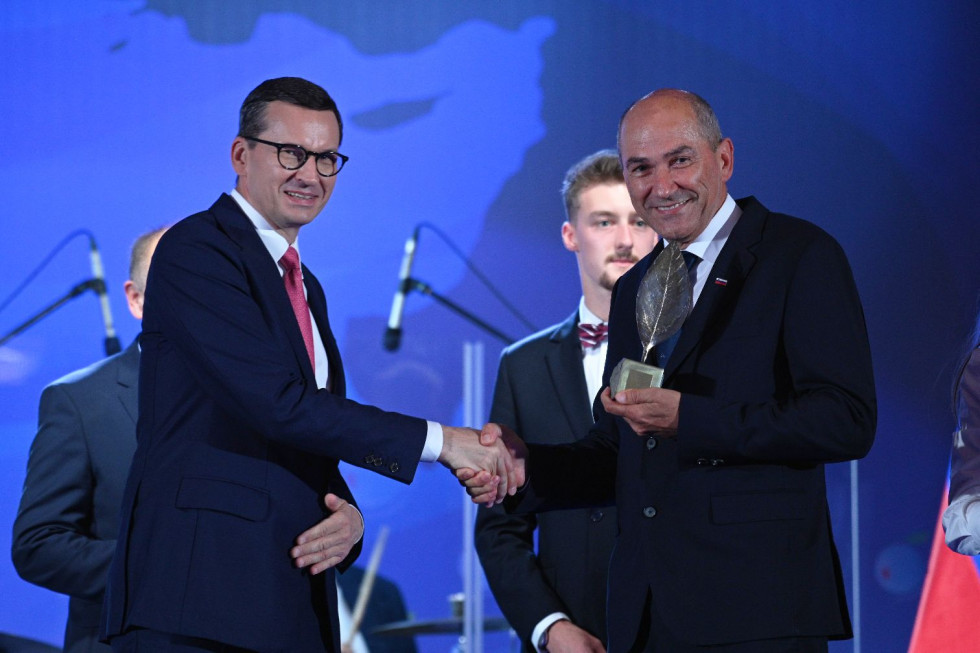Prime Minister Janez Janša named Man of the Year 2020 of Central and Eastern Europe
- Former Prime Minister Janez Janša (2020 - 2022)
Previous award winners include Mateusz Morawiecki, José Manuel Barroso, Jerzy Buzek, Vaclav Havel, John Paul II and other prominent figures. The Slovenian Prime Minister received the award for his outstanding achievements and contribution to Europe’s leadership. The award is granted by the Economic Forum's Programme Council, which is composed of prominent figures from politics and business. The award honours those who have left an important mark on Central and Eastern Europe as well as their own country in the previous year.
The Prime Minister gave the following acceptance speech at the award ceremony.
***
Dziękuję za zaproszenie. To dla mnie wielka radość być dzisiaj z Państwem w przepięknym Karpaczu.
Esteemed Friends, Excellences,
It is a great honour to receive this award, for Poland has been Slovenia's role model in our fight for freedom and democracy, just as it has been a model to other countries of Central and Eastern Europe, from its very beginnings nearly four decades ago, when Slovenia was still very much a part of communist Yugoslavia.
The courage and a vision of freedom of the Solidarity movement and John Paul II inspired all of us who were weighed down by the shackles of totalitarian regimes. I humbly accept this award and see it as a commitment and a responsibility to strive towards our historic goal, a Europe whole and free and at peace. A Europe that is united and strong, because all its member states are strong and free. A Europe of Europeans who share the values of European civilisation. A Europe of free, proud and sovereign European nations. We are Europeans precisely because we are Polish, Slovenian, French, Hungarian, Czech, Serbian, Ukrainian and so on.
Central Europe is marked by Christianity. Within this area, the principles of subsidiarity and solidarity emerged from the Catholic social teaching as central ideas of European integration. Furthermore, Central Europeans have been defending the European way of life throughout history. Consider the Battle of Vienna in 1683, when the Polish‑Lithuanian Commonwealth defeated the Ottoman Empire and saved the Holy Roman Empire led by the Habsburg Monarchy. This was European solidarity at its very best.
Centuries later, Central Europe was unfortunately the subject of conflict and division between great powers. For decades, it suffered under totalitarian rule. However, despite repression and totalitarian control, this culture shaped by Christianity inspired freedom fighters. The power of truth stood up against the brute force of oppression and ultimately prevailed.
We were inspired by the Solidarity movement and its motto: "Nie ma wolności bez Solidarności" – ''There is no freedom without solidarity." The fact that the movement under this very name paved the way to freedom and helped Poland and all other Central European countries regain sovereignty and freedom is of great importance and is also something worth thinking about today. Solidarity is a bond between the members of a community whose goal is to share in the common good they seek and which can only be achieved together. This should also be the everlasting objective or the motto of European integration.
In 1998, just as I was released from a Communist prison, Pope John Paul II said that Europe would not be able to breathe well until it breathes with both lungs. This then happened in 2004. However, our work is not yet finished. Europe is still not whole and free. We have work to do both in the Eastern Neighbourhood and the Western Balkans, as well as at home, in the European Union.
It seems that in a time of prosperity, Europe caught a cold. Hopefully, this cold does not develop into asthma. In its political debates and partly also in the conduct of some institutions, the European Union strayed too far from the fundamental principles of European integration, namely from seeking consensus, mutual respect, subsidiarity and solidarity.
I would like to conclude by saying this: there is no strong European Union without a strong Central Europe. In fact, there is no European Union without the Central European countries. Central Europe is increasingly becoming what the name of this part of the continent implies – central, both economically and in terms of values.
Let us once again recall that the principles on which the founding fathers of the European Union, the vast majority of them Christian democrats, based the European Union are rooted in the famous principle of St Augustine. This principle reads, "In essentials, unity; in non-essentials, liberty; in all things, charity". Only on these foundations can we build a solid European integration.
Thank you for your considerable efforts in this area both in the context of this forum and as the heart of Central Europe. This is how we learn from each other, and it is the only way for Europe to be successful – by respecting each other and learning from one another.
Dziękuję za uwagę. Thank you for your attention.


